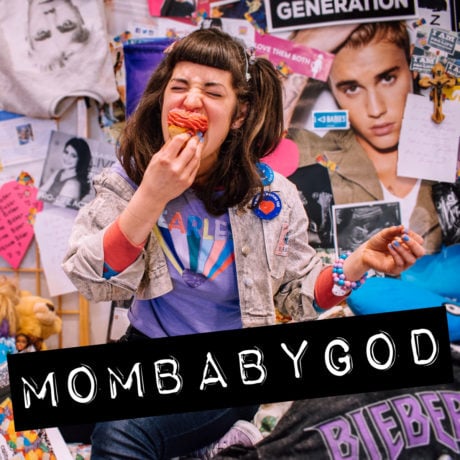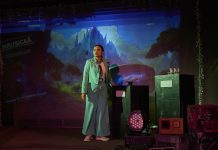Mom Baby God—a solo show written and performed by Madeline Joey Rose about the right’s attack on abortion rights—is as playful as it is powerful. The play centers on a fourteen-year-old girl, Destinee, and takes place at a Students for Life of America conference. When I caught the show at Forum Theatre in March 2017, it rocked me—not only because of its delightful dramatic/comedic form and Rose’s enthralling performance but also because of its urgent political content and the daring process by which the play came into being: Rose wrote Mom Baby God based on extensive firsthand research into the anti-abortion movement.
In this in-depth Q&A, Rose talks about her politics and her process, and shares insights with important implications for making both theater and social change.
Mom Baby God runs March 3 to 10, 2018, at Capitol Hill Arts Workshop produced by Taffety Punk Theatre Company and directed by Lise Bruneau. This is one not to miss.
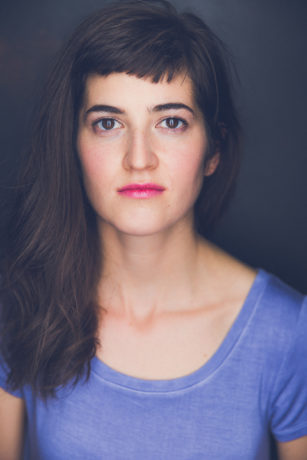
John: The backstory of Mom Baby God is a drama unto itself: You went into the Christian pro-life movement and turned what you learned into a solo performance piece. Then over several years you revised and refocused the piece to center on a character you created named Destinee, a teenage girl coming of age in the Christian pro-life movement. What first prompted you to begin work on this project?
Madeline: I started when I was a student at Hampshire College. I was part of an investigation of crisis-pregnancy centers, which are anti-abortion, right-wing clinics. They’re all over the U.S., and there was one in Amherst, Massachusetts, called Birthright. I went there posing as a pregnant college student and was really horrified by the experience.
They had baby clothes hanging up on the walls and what they call fetal development kits—which are scientifically inaccurate—and they gave me tea and cookies. Being immersed in that was powerfully disturbing. I wanted to bring other people, particularly on the left, into spaces like this, to understand the stakes. So I decided to spend a year doing research over 2012 and 2013, the fortieth anniversary of Roe v. Wade.
I’ve been an activist since I was twelve, when I was sent to the principal’s office for not saying the Pledge of Allegiance. In high school I became a socialist and was very involved with antiwar and immigrant rights and feminist activism. In 2011 there was action in Congress to defund Planned Parenthood, and there were mobilizations from pro-choice activists. For me it was a very exciting moment—seeing people rise up and call themselves feminists and protest the attack on abortion rights.
Through that activism, I started to learn more about the extent of the attack on abortion rights. Being in that movement is what gave me the fire to want to do something broader about it and use theater as a tool.
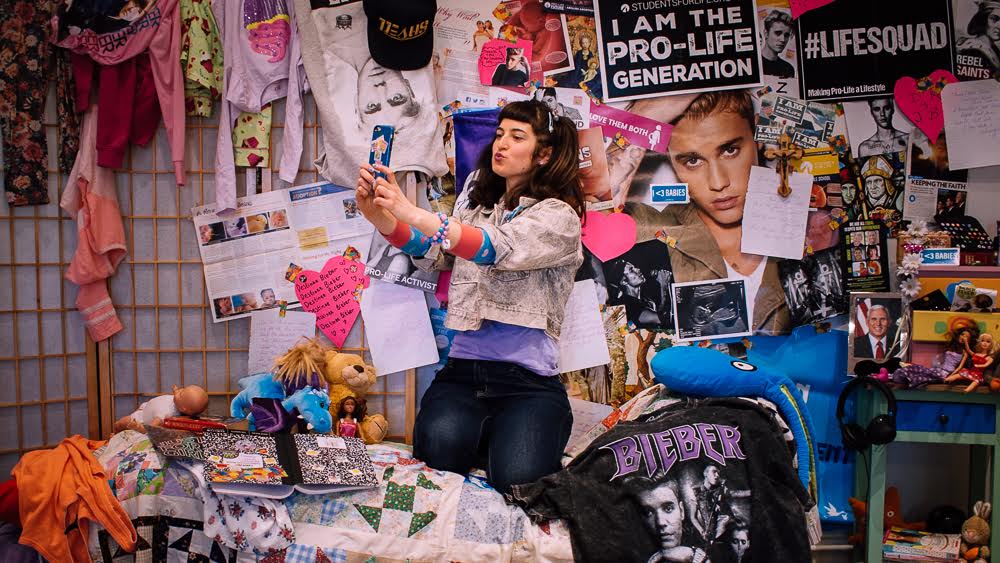
Did you go undercover?
No. My college thesis committee was like: you need to not have a fake identity! But I definitely tried to aesthetically fit in. I think I wore an American flag t-shirt at one point. At that point I envisioned the piece to be more in the style of documentary theatre like The Laramie Project or Anna Deavere Smith’s work, and so everybody I interviewed at that point signed waivers. I was very clear about what I was doing. When I told people I’m a student, I’m writing this play, your voice will be heard onstage, most of them were like: great, I’m glad somebody’s interested in what we’re doing, and I’m glad to share my story. When I went back to the Students for Life conference this year to do more research and re-develop the play, I didn’t think that much about trying to fit in visually—I figured everyone would have forgotten who I was at this point. And then of course someone at the registration desk immediately said, “You look really familiar to me…are you from Mom Baby God? We all know who you are.” That was fun.
What was your method, recording people and transcribing?
Yeah, recording on my phone, transcribing, and also just taking people in. Because I was recording and not having to write things down, I was able to study people’s mannerisms and facial expressions and study the way that they were speaking. These right-wing conferences also encouraged social media use, so everybody is taking out their phones and filming things, which was a helpful way to capture the atmosphere and to return to that material when creating the world of the play in the writing and design.
But the most useful part of my immersive research was hanging out with teenagers at these right-wing conferences and having very informal conversations and getting a better sense of the culture of the right wing and what it feels like to be a part of it—less so the specifics of what people were saying but more: what is the emotional life of being a fourteen-year-old girl who’s part of a movement that is actively stripping away your own rights?
Mom Baby God obviously incorporates details you could only have learned firsthand about pro-life organizing methods, pro-life messaging to young people, and pro-life role models.
One of the benefits of really studying the right wing is understanding what their tactics are and what is resonating with people, and I think that’s really important to see the context that people are coming to these politics from; it’s from fear, from hopelessness. Then you start to see the contradictions where someone could be pulled in a different direction ideologically, but they’ve unfortunately been met by a more organized and aggressive right-wing movement first.
Who is Destinee in the play, who is she to you, and who do you want her to be to the audience?
Destinee is this very driven but impressionable fourteen-year-old, and she goes to the Students for Life of America conference, which is a real conference. The whole play takes place at the conference, and it’s her experience there as she’s trying to become a right-wing leader. But then she meets this boy who reminds her of Justin Bieber named John Paul. It’s about her trying to navigate a coming of age sexually, and how much those feelings come up against what she’s supposed to believe, think, and feel. Her ideas are changing and she’s at the beginning of her own journey. That gives the audience a way in, to say: there’s some hope that she could change or her life could diverge from this path.
I relate to her a lot. I grew up in the Bush years. I grew up under all of the abstinence-only quote-unquote sex education and sexual purity politics. That culture really shaped my life, so I’ve experienced firsthand the ways the sexual politics of shame and purity can have such a negative impact on young people and how important it is to center conversations about sexuality and gender in the fight for bodily autonomy.
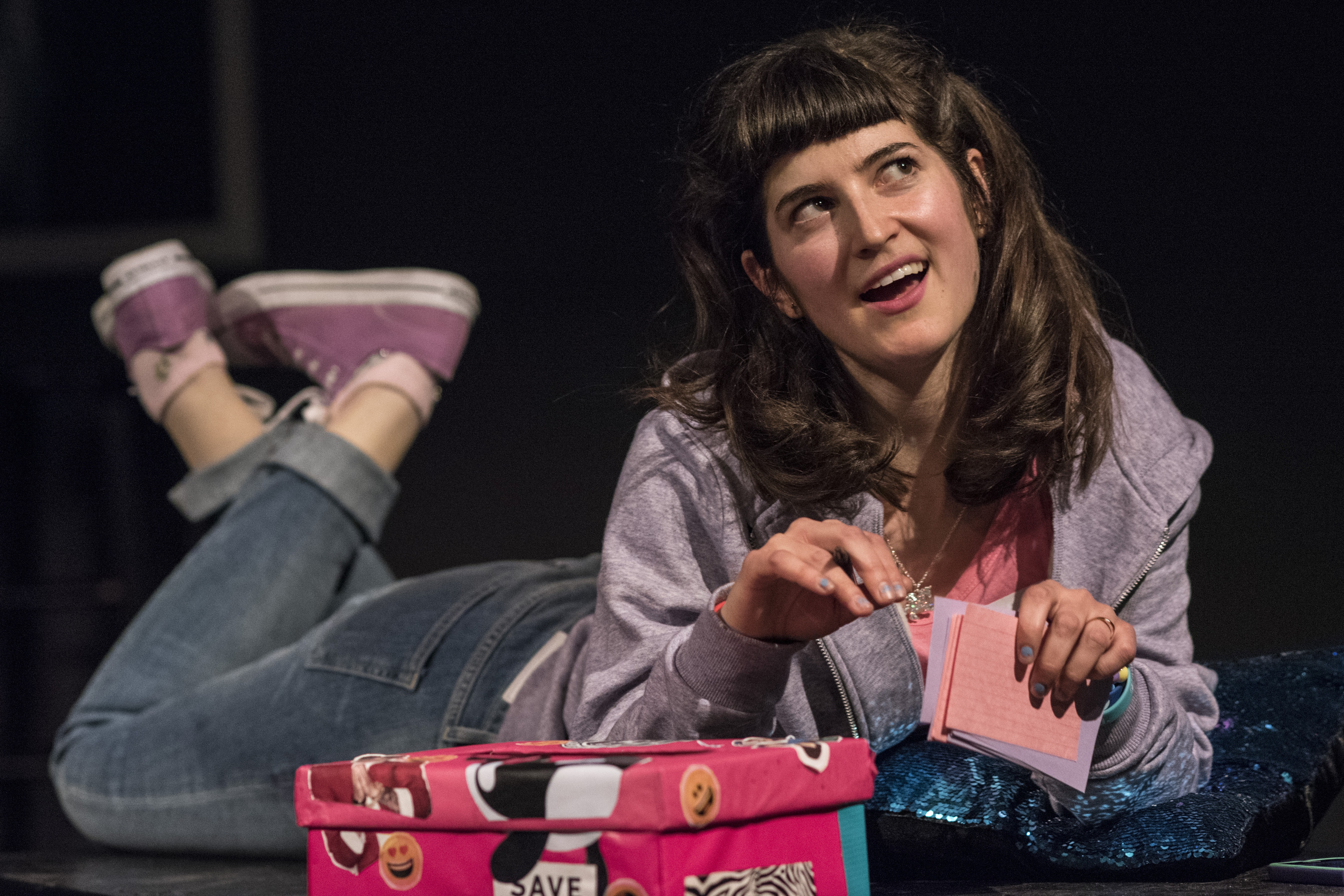
During Mom Baby God, Destinee refers to (by my count) three real people: pop heartthrob Justin Bieber, nervy pro-life activist Lila Rose, and “President” Mike Pence. You also play multiple fictional roles—quickly switching between them, sometimes swapping minimal costume pieces—Destinee’s grandmother, pro-life feminist Trish, teenage pro-life activist and Destinee’s rival Makayla Roberts, abstinence coach Bryan Dwayne, boy band heartthrob John Paul Alexander II.
He’s my favorite character to play. He’s a very swaggy but tender teenage boy in a Christian EDM Dance Crew. Very cool.
During the play we see Destinee go from crushing on Justin (whose photograph she adoringly kisses) to a for-real hookup with John Paul. I found that narrative one of the most compelling aspects of the play (it was so good, I wanted more of it). Would you talk about that character arc of Destinee’s—how you see it (or how you want it to mean in the piece)—and what audience reactions have been to Destinee’s and John Paul’s sexual encounter?
As the show has evolved the relationship between Destinee and John Paul has become much more nuanced, and this newest version in 2018 fleshes it out even more. When I first wrote the show in 2013, John Paul was a bit of a caricature. I didn’t give their flirtation time in the play to breathe into a more mutual crush, and so the power dynamics seemed very imbalanced in ways I didn’t understand until touring it. I learned from audience reactions that the play was being understood as being about this one bad teenage boy manipulating a younger girl. It was important to me to give both of them more investment in the relationship because, I think, there’s a false narrative that teenage girls are never sexual, and if they have sexual experiences they are always being taken advantage of. And similarly, there’s the false idea that all teenage boys are ready for sex at all times and have it all figured out. Those narratives don’t serve anybody. I wanted the moments between Destinee and John Paul to explore more the culture of shame and sex-negativity, and therefore the confusion and the lack of vocabulary that young people have about sex in a healthy and consensual way. They both really want to be there and the problem is actually that neither one of them knows how to express their desires because they’re both so steeped in shame—they think what they’re doing is so wrong—and as a result there’s a lot of pain and confusion in moments that could otherwise be really positive for both of them.
I learned from your piece something that was news to me: the way today’s pro-life messaging to girls lifts language from feminism.
The anti-abortion movement has completely co-opted left-wing rhetoric. When I was first doing the research, they were co-opting Occupy slogans; they were taking the protest chant We are the 99 percent and turning it into We are the pro-life generation. They now have a whole mission to reframe the movement as a feminist movement, and adopt all of the slogans of the Women’s March and its visuals. The most shocking thing to me doing research in 2018 was the ways they’re attempting to use the language of #MeToo and the movement against sexual violence. They’re talking about rape, but they attribute sexual violence to “a culture of promiscuity”—and then you have the anti-abortion groups who continued to endorse Roy Moore even after his abusive behavior was well known. I saw more rifts in the movement around the issue of sexual violence than I’ve ever seen before, and I think that’s a testament to the strength of the #MeToo movement that has changed public opinion.
There’s a moment in Mom Baby God that vividly exemplifies this co-opting trend, when Trish, a pro-life feminist, tells Destinee that abortion upholds the patriarchy because it allows guys to fuck around. I heard some gasps at that point. Meanwhile, flashing back to the early days of mobilizing to protect a woman’s right to choose, I recalled how radical feminist pro-choice activists at that time were very aware that the support they were getting from male lefties was predicated on exactly that self-interest: coital access without commitment.
That particular brand of right-wing feminism is the most effective and dangerous, I think, because they’re tapping into real pain women are experiencing in a misogynistic society, and it understandably resonates with people. But their politics are still ultimately about sexual purity outside the context of heterosexual monogamous marriage. By contrast, I think, the movement against sexual violence is contributing really important language and shifting the conversation about consent and about gender in relationships, and hopefully some of the people who would otherwise be pulled in a right-wing direction by the so-called “pro-life feminists” will instead be inspired to join the movement against sexual violence and for reproductive rights.
I should add, though, that the woman who Trish is based on—an activist I interviewed in 2013 and whose politics I’ve followed since then—has in the past year or so become an open white supremacist. When I realized that, I decided I needed to re-develop that character to reflect her political development and the pretty horrifying turns she has made. This is someone who openly describes herself now as an “ethno-nationalist” and “traditionalist” and posts Proud Boys propaganda on her social media.
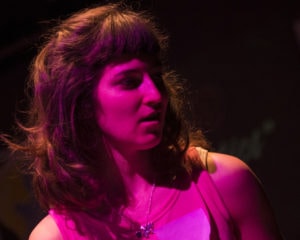
If you could communicate what you know about what you do, what would you say?
Being an actor is a daily practice of empathy in the way that working out at a gym is working out your muscles. When I’m working on a character, I’m exploring this other person’s worldview and attempting to embody another person’s reality. When you do that you learn a lot about people’s contradictions. Nobody is totally consistent. That necessarily bleeds into how I view people offstage as well.
We all live in a society where the ideas that we get are from mainstream media and from the government, which are heavily right-wing and corporate. And most people are learning about the world through those channels. Therefore people are going to grow up in the world with all kinds of contradictory and reactionary ideas. Nobody is born with reactionary ideas. And people’s ideas can change. Even on the left, that can be a controversial statement right now. In the culture of social media and internet political conversations, there’s such a quickness to go: well, this person said this one thing and I took offense to that and so I’ll dismiss them forever, I’m never going to take them onto our side as my comrade.
To be clear, there are of course toxic people who shouldn’t be engaged with, and I don’t think this means that “all opinions are valid” and we should just all be friends with right-wingers and be polite to each other. Ideas need to be challenged. Nazis need to be protested and shut down. The anti-abortion movement is a violent movement, both by targeting and killing abortion providers, and also by robbing people of their right to make decisions about their bodies and by instilling lifelong shame in people for being sexual or for being queer. There should be no room for that.
But I do think we’re too dismissive with people who are attempting to take a stand for justice but maybe don’t have all the right lingo down or still hold some contradictory ideas, and we don’t acknowledge the ways people’s ideas can change through struggle and through political debate in a movement, and how our own ideas have evolved through that same process.
I think being an actor and a theater artist forces you to interrogate the ways people form their behaviors and actions, their worldview, and to see their complexity. Nobody is just one thing. Everybody wears costumes. People change—otherwise it’s a very boring play. Listening to and embodying other people forces you to see the depth and possibility in each person, which I think can be a very hopeful thing.
How has working on Mom Baby God changed you?
I’ve learned a lot more about how hurtful these politics are ultimately to men too. Talking with teenage boys in the anti-abortion movement, you see how limiting these very strict gender roles are to them too: Don’t have emotions, be tough, don’t be gay. It’s extremely repressive and damaging, and I think men have a real stake in gender liberation that goes beyond being allies. I’ve gained a greater curiosity and urgency to understanding what is drawing both men and women to these politics and what we’re all losing as a result.
Mom Baby God plays March 3 to 11, 2018, at Taffety Punk performing at Capitol Hill Arts Workshop (CHAW) – 545 7th Street, SE, in Washington, DC. Tickets are available online.
LINK:
Magic Time!: Life Lessons of ‘The Real Americans’: A Q&A with Playwright-Performer Dan Hoyle by


